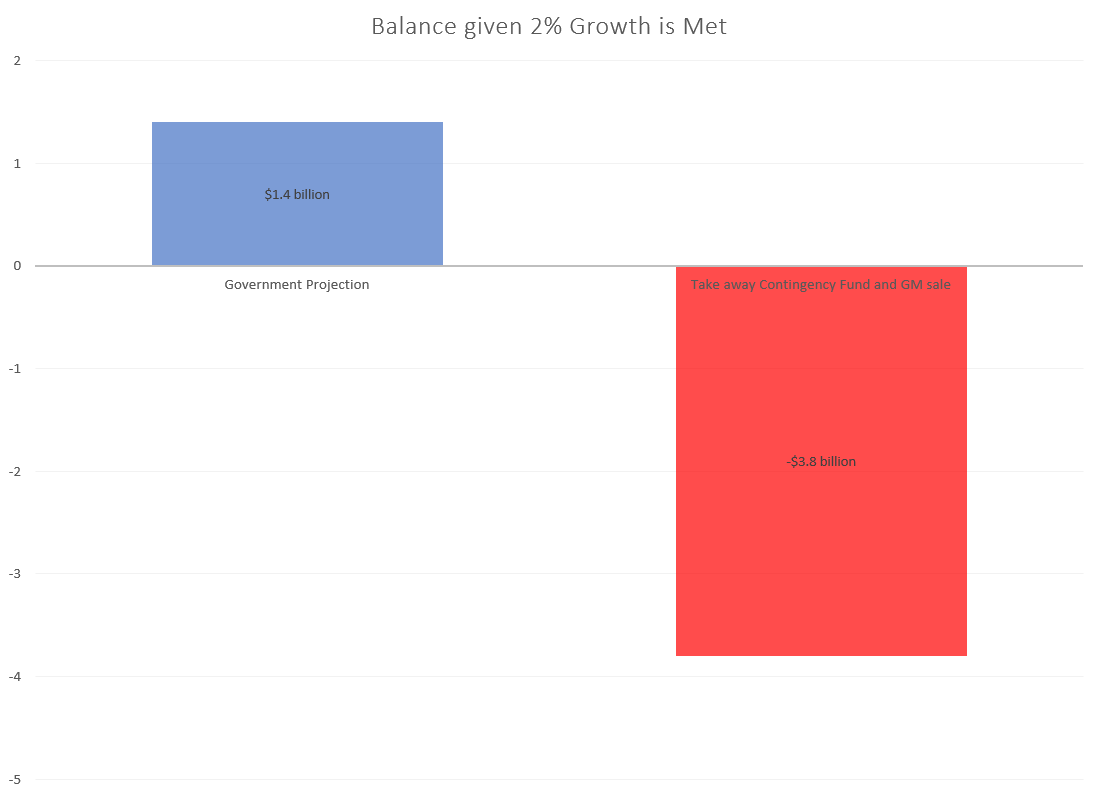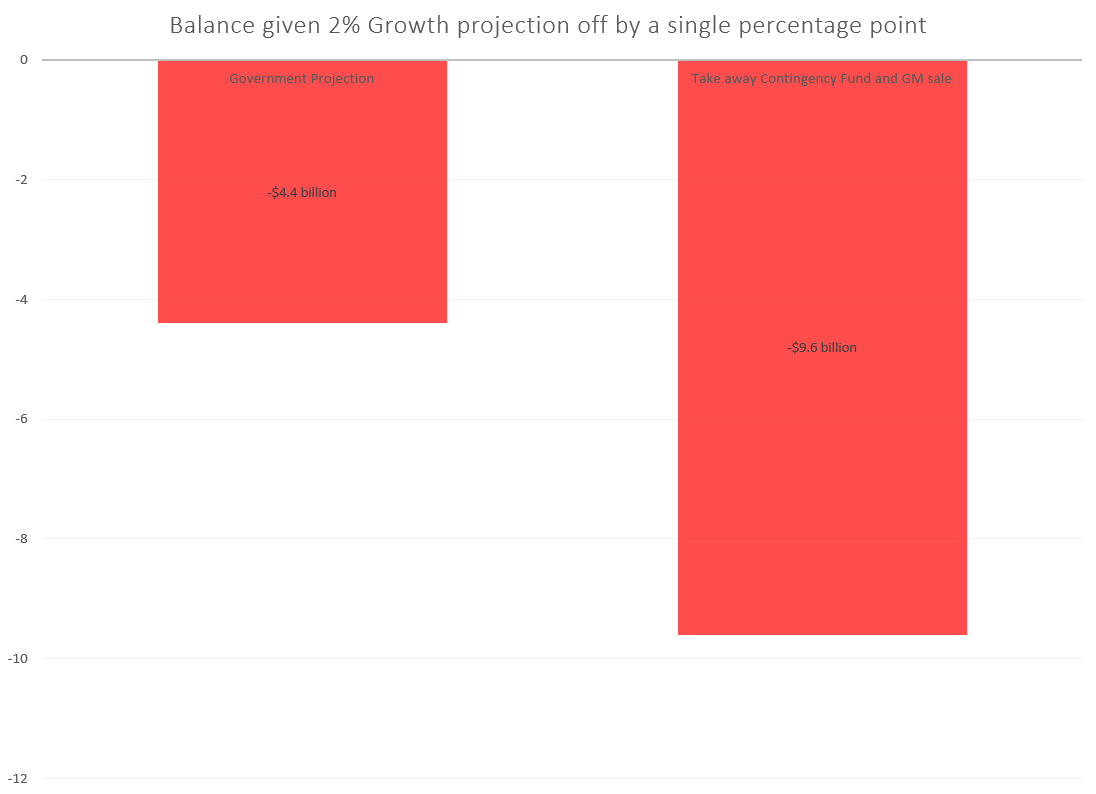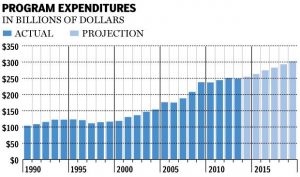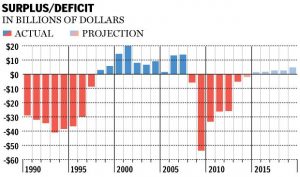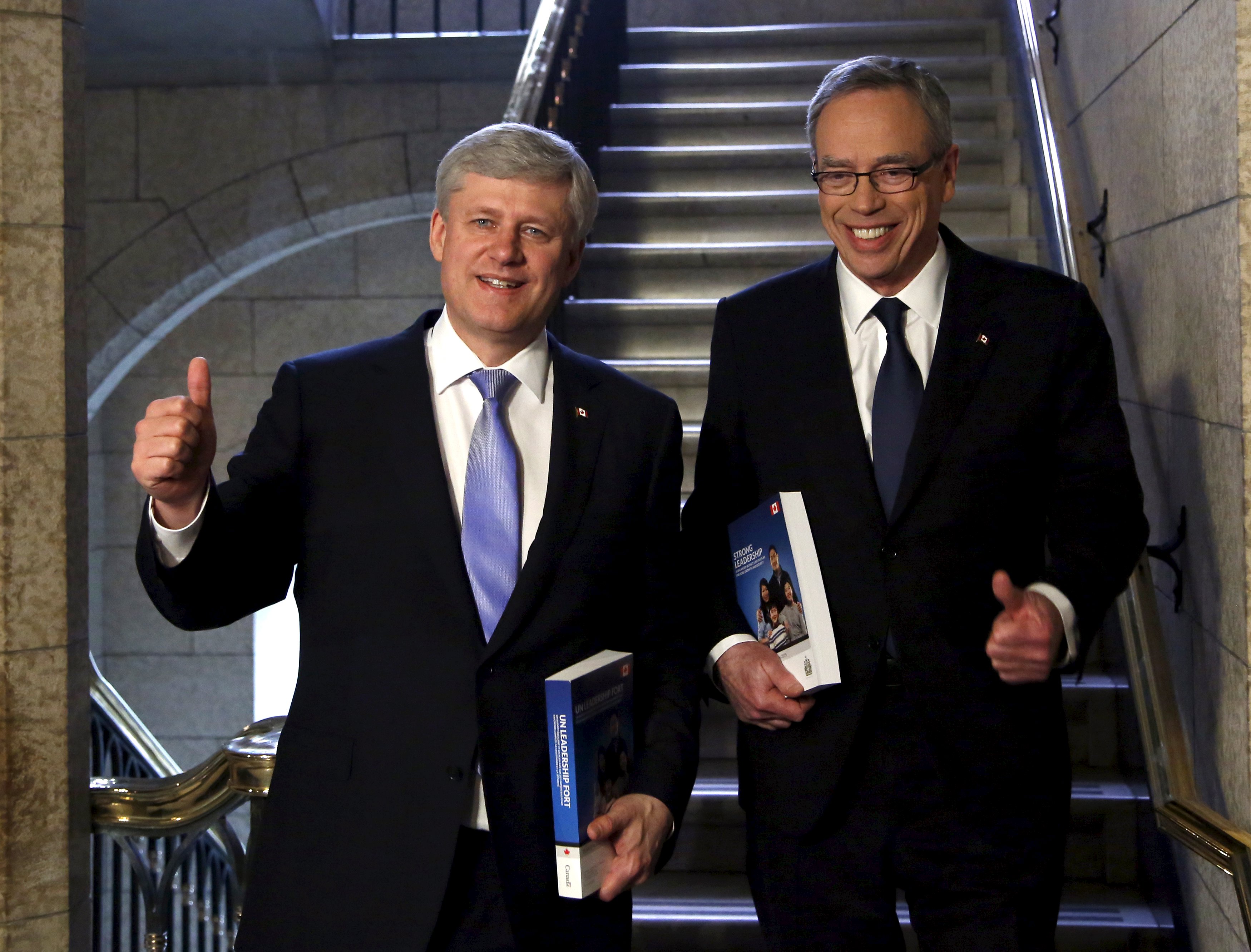
Why Don’t We Leave that to Prime Minister Stephen Harper’s Granddaughter to Solve That Problem?
Conservative Finance Minister Joe Oliver delivered his first surplus budget to paint a rosy picture for the upcoming election. With a $1.4 billion surplus this year, and steadily growing over the next four, there is now room for new spending programs – or so it seems. The Conservatives have managed to create a budgetary illusion and with balanced budget legislation to take place in addition, it is time we look closer at the numbers. The surplus looks great on paper, but just how great is it?
The surplus looks great on paper but…
For the first time since they took office in 2006, the Tories have a surplus and for the first time their talking points about being prudent economic managers holds some merit – at least on paper it does. It is worth noting this surplus is the product of a series of one-time transactions. Meaning, next year, most of this surplus will have washed away.
Canada was supposed to break even with oil revenues this year, but when the price of oil dropped, a projected $6 billion hole in revenue appeared. Instead of having a concrete economic plan, Joe Oliver opted to delay the budget to frantically apply some patch work.
Canada’s contingency fund is meant to fund emergency situations, and with an election in a few months, taking $2 billion out of the $3 billion fund should cover the emergency situation quite nicely. This means this budget will only set aside $1 billion for emergency situations. Without touching the contingency fund, Canada would have a $600 thousand deficit. However, the contingency fund isn’t the first in the Conservatives’ panicked recipe for a surplus.
In the beginning of April, the government decided to sell its shares in General Motors to the tune of $3.2 billion. This figure is $3.5 billion short of the sum taxpayers pumped into the struggling industry at the height of the recession. Had the government waited, they could have got a bigger return. Without making this sale, in addition to the contingency fund cut, the government would be posting a $3.8 billion deficit – you read that right: deficit. The list goes on to include government property that was auctioned off.
The reality is: the surplus is a spoof and a political maneuver.
To go in even further detail, the budget assumes 2% growth in their projection and the fiscal space is so narrow that should their projection be off by a single percentage point, we would have a $3.4 billion deficit this year, followed by a $4.4 billion deficit four years out. Take away the contingency fund and GM sale, those numbers get bleaker to the tune of a $9.6 billion deficit this year.
Comparing government projections (both accurate and not) to totals without the contingency fund and GM sale.
Take away the $2 billion from the contingency fund and the $3.2 billion sale of GM stocks and the fiscal picture isn’t so rosy.
So the Conservatives want to bring in balanced budget legislation now…
Bundled with the new budget comes balanced budget legislation, which legislates penalties for future governments that run deficits. Oliver attempted to take a swipe at former Liberals who he says want to “spend money we do not have,” and pledged “We will never repeat those mistakes.”
Damned as it may be, the budget is more a campaign document than a fiscal plan, back-loading most spending commitments to years to come. Billions of dollars that will be invested into infrastructure and public transit won’t leave the Treasury until 2017 the soonest. Don’t be surprised when the Conservatives say a vote for the opposition means the spending promises made in the budget will disappear. However, this year, the Conservatives have found money to double the limit to the Tax Free Savings Account and implement income splitting, both costly measures which will only show the real burden in years to come.
Oliver said this legislation would only allow a deficit – and not enforce the following penalties – in response to a recession or “extraordinary circumstance, that is, war or natural disaster, with a cost exceeding $3 billion in a year.” In addition, the finance minister would have to testify to the Commons finance committee to present a plan and “concrete timelines” to balance within 30 days of posting the deficit. The deficit would entail an automatic freeze on operating spending and force a 5% wage freeze for cabinet ministers and deputy ministers in this event.
The Conservative economic track record to date
The legislation was meant to be a political attack against the Liberals and NDP and could apply should one of these parties win the election and get saddled with the new expenditures the Conservatives plan to implement.
Political games aside, it is important for the Conservatives to remember that throwing stones in a glass house is never effective. Compare the Conservative track record for the last ten years to the previous Liberal track record for the ten years before it, we paint an interesting picture.
It may not be wise for the Conservatives to run this election on a lean government, fiscally responsible agenda because their track-record shows the opposite. The Conservatives are clearly the last people to ask for advice on balancing a budget.
To make matters worse, the Conservatives’ reckless spending over the past 9 years has had a direct impact on our national debt. When they took office, the debt was $482 billion and now it is $617 billion. Over the last ten years, the Conservatives added $135 billion to the national debt, which represents nearly a quarter of it.
The hostage campaign and reckless spending to come
Now, with such a fragile budget, the Conservatives have opted to postpone infrastructure spending to prioritize campaign gimmicks holding funding at hostage for another mandate.
One of their promises creates a new income splitting scheme which would only benefit 16% of Canadians at best. It would ring to the tune of Harper’s 2011 promise: to implement income splitting when the books are balanced. However, the Parliamentary Budget Office estimates the program will initially cost $2.2 billion per year – and will likely grow over time and with a fragile economy this political move will likely be painful on the books. The policy created controversy when former Finance Minister Jim Flaherty admitted the program “benefits some parts of the Canadian population a lot — and other parts of the Canadian population virtually not at all.” Overall, this money would be better spent in infrastructure projects than being funneled to the 16% of Canadians who are in the upper-middle to high class who need it the least.
The second immediate promise doubles the limit on the Tax Free Savings Account, another measure that requires money to enjoy. While it will surely be popular in the election, its price tag risks inflating over time. To make matters worse, retirees who store millions in this account would still be eligible for government programs, another spoon to feed.
In the meantime, the much needed tax cut for small businesses is slotted to wait for a future budget, as is the public transit initiative to reduce congestion, as is almost all future infrastructure spending. The military will get a $12 billion increase, which won’t meet NATO’s funding standards with respect to the GDP, and will also be held hostage for the next government.
In short: Give the base what it wants now, be responsible later.
There is no doubt sustaining these policies will require a tax hike – something none of the political parties have the appetite to swallow. Frankly, the party that should admit that is the Conservatives, who know it will be required several years down the road, but would rather paint the narrative now so future governments fall into the situation and fulfill Harper’s narrative. In addition, slashing these programs will play into the Conservatives’ hostage campaign which will tell Canadians they will lose what they like and all other important spending if the Conservatives lose the election. This is not only politics at its worse, it is reckless and irresponsible fiscal policy – the kind that risks putting Canada back into the dire financial shape it was in 1992 when draconian austerity was the only option to restore Canada’s economy and avoid going off the cliff.
“Well, why don’t we leave that to Prime Minister Stephen Harper’s granddaughter to solve that problem?”
Perhaps what is even worse is the Conservatives know their reckless campaign promises will be costly, and when Finance Minister Joe Oliver acknowledged the issue in an interview with CBC’s Amanda Lang Wednesday.
“Well, why don’t we leave that to Prime Minister Stephen Harper’s granddaughter to solve that problem?”
In summary, Oliver presented a fake surplus to create an illusion that the economy is going well, but in fact, this surplus is shaky on economic grounds and on its very foundation. Take away the cut to the contingency fund alone – and/or the sale of GM shares – and we have a deficit. Add to that, the Conservatives are now saying the economy is in great shape and are introducing large and costly programs whose true costs won’t show until future budgets when the economy will have crippled existing projections. Should the Conservatives win the election in October when this happens, it will be fun to watch them dodge their new balanced budget law by either creating a recession, emergency, or war. Just to add insult to injury, when the Conservatives were grappling with the deficit, they spent millions on themselves, their perks and increases to severance. Now, they will tell you to swallow their budget or risk losing the candy but in reality our economy can barely support the programs it has now and the Conservatives know they will not be able to fulfill the necessary infrastructure spending and keep their targeted promises to appeal to their base.
From a fiscally Conservative point of view, however, the priority of the government should be infrastructure and debt reduction but we now know how the Conservatives think.
Bridges are falling apart: Well, why don’t we leave that to Prime Minister Stephen Harper’s granddaughter to solve that problem?
Canada’s middle class is having a hard time making ends meet: Well, why don’t we leave that to Prime Minister Stephen Harper’s granddaughter to solve that problem?
Canada’s debt is now $617 billion and a quarter of it came from the Conservative government: Well, why don’t we leave that to Prime Minister Stephen Harper’s granddaughter to solve that problem?
Joe Oliver summed up the Conservative Economic Action Plan: Why don’t we leave that to Prime Minister Stephen Harper’s granddaughter to solve that problem?
